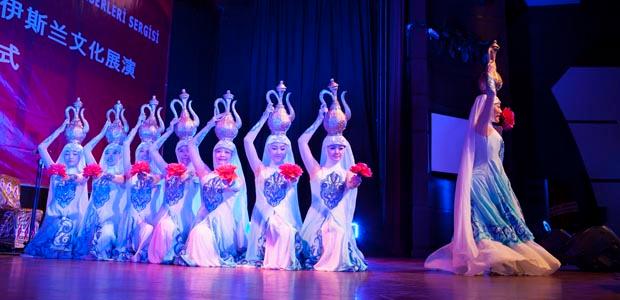In Istanbul, an Exhibition on Islam in China Accentuates the Positive
Chinese dancers on 31st August 2012 at the Fatih Ali Emiri KŸltŸr Merkezi in Istanbul, Turkey. (Photo: Agata Skowronek)
Chinese government seeks to soothe Turks’ concerns about the ill treatment of China’s 23 million Muslims, including Turkic Uygurs. Unlike Tibetans, China’s Uygurs have no Dalai Lama to galvanize international support.
Muslims in China make up less than 2 percent of the population. But that’s still 23 million people, almost the population of Texas. And Zhang Jian from the Chinese state religious body, says the exhibition is meant to inform international audiences about the richness of Islamic culture in China.
“To know more about how Chinese Muslims live their lives in China and how they live their religious life,” says Jian.
There’s a lot of rumors he says, that the Chinese government prevents Muslim men from wearing beards for example, or that it stops women from covering their heads.
It’s not true, he says. Muslims live freely in China and the exhibits are proof of this reality.
“The reasons we hold such kind of activity, to know what really happens in China,” he says.
The exhibition features traditional songs and dances by two Muslim performing groups. The Uygur dancers are dressed in intensely colorful costumes as they perform tightly choreographed songs and dances. But unlike the music, and the rosy picture painted by the government official, life for Uygurs in China isn’t especially joyful.
“I don’t want to speak Chinese,” says a Uygur émigré I spoke to at the performance. She didn’t want to use her name, fearing reprisals against her family in Xinjiang. She says the Chinese government is trying to wipe out the Uygur language.
“I’m afraid for the future. I fear for the Uygur language that everyone will forget it everywhere it’s only Chinese,” she says.
The woman says the Chinese government is trying to assimilate Uygurs by force, eliminating Uygur-language education and giving economic opportunities only to the majority ethnic Han Chinese.
Human Rights Watch concurs. A recent report said, “under the guise of counterterrorism and anti-separatism efforts, the government maintains a pervasive system of ethnic discrimination against Uyghurs and other ethnic minorities.” Perhaps more than anywhere else in the world, in Turkey, the people and government are sensitive to Uygur pleas. Hugh Pope is a Turkey analyst and author of “Sons of the Conquerors: The Rise of the Turkic World”.
“Every Turkish school child is taught that the Uygurs are brothers,” says Pope. “Eight million people who are under Chinese sovereignty in Xinjiang, or as it used to be known East Turkestan, because it’s the eastern bit of where Turks still live in Central Asia, still in the Turkish consciousness as being a Turkic people, blood brothers according to the state ideology of the Turkish Republic.
China hopes that cultural exchanges like the one happening now will help ease Turks’ reservations about Muslims in China. But Pope says PR is probably not even needed. China’s economic power will always move Turkey more than the human rights of their Uygur brothers.
“Most people are interested in buying Chinese products, Turkish companies are building things in Chinese cities just like everyone else in the world,” Pope says. “We are seeing the beginning of a military relationship. Turkish leaders do go and visit Xinjian and wear Uygur dress. And China is happy with that because it shows that everything is alright.”
Turkey is a rising regional power but it’s still a medium-sized developing country. Its not in Turkey’s interest to have trouble with China, says Pope. Whats more, most of the Uygurs’ ancient cities have already been razed, to make way for new cities likely to be dominated by majority ethnic Han Chinese.
